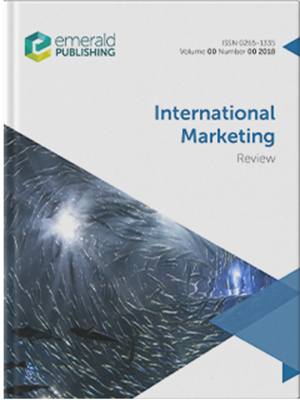企业社会责任传播与国际营销:新冠肺炎疫情的启示
IF 4.6
3区 管理学
Q1 BUSINESS
引用次数: 3
摘要
目的本研究旨在分析2019冠状病毒病(新冠肺炎)大流行期间《财富》百强企业的企业社会责任(CSR)沟通。具体而言,作者研究了国际公司在疫情期间向客户传达的企业社会责任信息,特别关注这些公司在推特上的帖子。除了确定国际公司交流的内容外,作者还确定了公司与新冠肺炎相关的企业社会责任交流的动机,以及公司如何从战略上进行企业社会责任沟通。设计/方法/方法使用Nvivo,作者使用Twitter的“高级搜索”工具对《财富》前100强公司的新冠肺炎相关推文进行了内容分析。该分析包括2020年2月1日至2021年9月期间发布的推文,这段时间代表了疫情的高峰期。研究结果表明,国际公司与新冠肺炎相关的企业社会责任反应是由对组织价值观的承诺、对及时应对新冠肺炎的认可、抗击新冠肺炎的无私动机以及与社会运动的一致性驱动的,这些社会运动创造了客户应对新冠肺炎大流行的期望。大多数公司对企业社会责任沟通采取应对策略,告知客户他们对公司流程变更和疫情对健康的影响等几个问题的新冠肺炎应对措施。实际含义研究表明,企业的企业社会责任实践应战略性地纳入组织的国际营销计划,而不是仅仅是对危机的断断续续的反应,以获得与营销相关的利益。提出了一些建议,以加强公司对企业社会责任沟通采取积极主动、以参与为导向的方法。独创性/价值国际公司在外部危机期间的企业社会责任沟通与国际营销的关系尚未得到充分研究,因为大多数研究都认为是内部企业危机。本研究以具有全球影响的外部危机(新冠肺炎大流行)为重点,推进了国际公司与客户进行企业社会责任沟通的现有知识。此外,这项研究为综合、协调和一致的企业社会责任信息和战略的作用提供了新的见解,这些信息和战略针对的是国内和国际客户在应对新冠肺炎大流行时的需求和期望。本文章由计算机程序翻译,如有差异,请以英文原文为准。
CSR communication and international marketing: Insights from the COVID-19 pandemic
PurposeThe purpose of this study is to analyze the corporate social responsibility (CSR) communication of the Fortune top-100 companies during the coronavirus disease 2019 (COVID-19) pandemic. Specifically, the authors examine the messages of international companies' CSR communication to customers during the pandemic, focusing particularly on the companies' posts on Twitter. In addition to identifying what international companies communicate, the authors determine the motives of companies' COVID-19-related CSR communication as well as how companies strategically approach CSR communication.Design/methodology/approachUsing Nvivo, the authors carried out content analysis of the COVID-19-related tweets of the Fortune top-100 companies using Twitter's ‘advanced search’ tool. The analysis included tweets posted between 1 February 2020 and September 2021, a period that represents the peak of the pandemic.FindingsStudy findings indicate that COVID-19-related CSR responses of international companies are driven by commitment to organizational values, attainment of recognition for timely response to COVID-19, altruistic motives to combat COVID-19 and congruence with social movements that create expectations from customers to respond to the COVID-19 pandemic. Most companies adopt a response strategy to CSR communication, by informing customers of their COVID-19 responses in relation to several issues such as alterations in companies' processes and the impacts of the pandemic on health.Practical implicationsThe study suggests that the CSR practices of companies should be strategically embedded in organizations' international marketing plans and not remain just on-off responses to crises should marketing-related benefits be obtained. Several recommendations are made to strengthen companies' adoption of a proactive, engagement-oriented approach to CSR communication.Originality/valueThe CSR communication of international companies during external crises has not been sufficiently studied in relation to international marketing, as most studies considered internal corporate crises. Focusing on an external crisis (COVID-19 pandemic) with global impacts, this study advances existing knowledge on international companies' CSR communication to their customers. Additionally, this study offers new insights on the role of integrated, coordinated and consistent CSR messages and strategies, which are targeted to the needs and expectations of domestic and international customers in response to COVID-19 pandemic.
求助全文
通过发布文献求助,成功后即可免费获取论文全文。
去求助
来源期刊

International Marketing Review
BUSINESS-
CiteScore
8.70
自引率
12.00%
发文量
55
期刊介绍:
International Marketing Review (IMR) is a journal that has, as its core remit, the goal of publishing research that pushes back the boundaries of international marketing knowledge. IMR does this by publishing novel research ideas, and by publishing papers that add substance to, question the basic assumptions of, reframe, or otherwise shape what we think we know within in the international marketing field. IMR is pluralistic, publishing papers that are conceptual, quantitative-empirical, or qualitative-empirical. At IMR, we aim to be a journal that recognizes great papers and great research ideas, and works hard with authors to nurture those ideas through to publication. We aim to be a journal that is proactive in developing the research agenda in international marketing, by identifying critical research issues, and promoting research within those areas. Finally, IMR is a journal that is comfortable exploring, and that fosters the exploration of, the interfaces and overlaps between international marketing and other business disciplines. Where no interfaces or overlaps exist, IMR will be a journal that is ready to create them. IMR’s definition of international marketing is purposefully broad and includes, although is not restricted to: -International market entry decisions and relationships; -Export marketing and supply chain issues; -International retailing; -International channel management; -Consumer ethnocentrism, country and product image and origin effects; -Cultural considerations in international marketing; -International marketing strategy; -Aspects of international marketing management such as international branding, advertising and new product development.
 求助内容:
求助内容: 应助结果提醒方式:
应助结果提醒方式:


